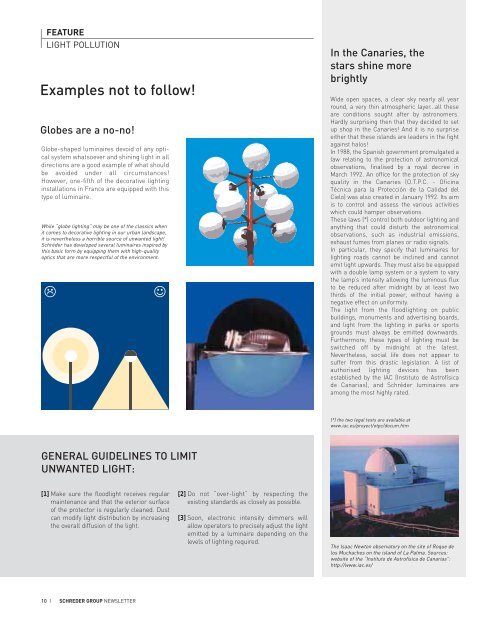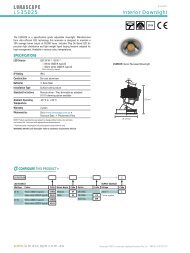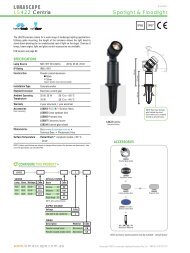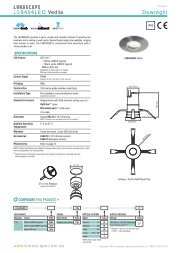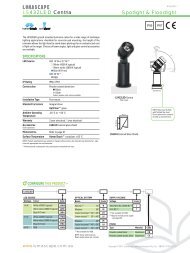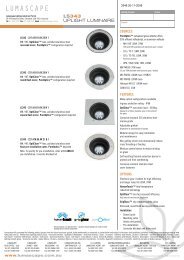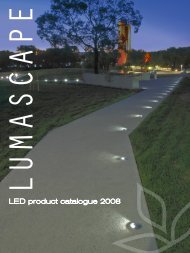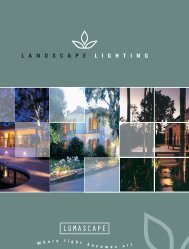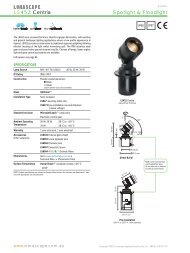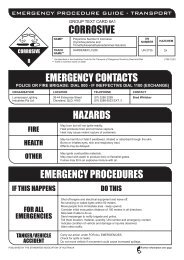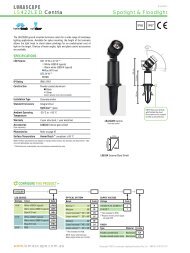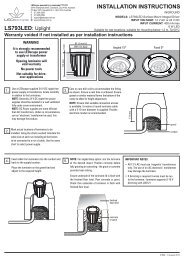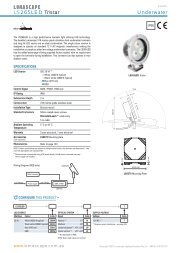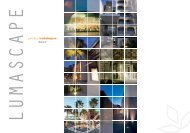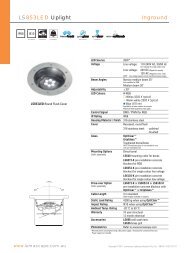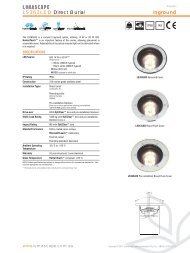Schréder - Lumascape
Schréder - Lumascape
Schréder - Lumascape
You also want an ePaper? Increase the reach of your titles
YUMPU automatically turns print PDFs into web optimized ePapers that Google loves.
FEATURE<br />
LIGHT POLLUTION<br />
Examples not to follow!<br />
Globes are a no-no!<br />
Globe-shaped luminaires devoid of any optical<br />
system whatsoever and shining light in all<br />
directions are a good example of what should<br />
be avoided under all circumstances!<br />
However, one-fifth of the decorative lighting<br />
installations in France are equipped with this<br />
type of luminaire.<br />
While “globe lighting” may be one of the classics when<br />
it comes to decorative lighting in our urban landscape,<br />
it is nevertheless a horrible source of unwanted light!<br />
<strong>Schréder</strong> has developed several luminaires inspired by<br />
this basic form by equipping them with high-quality<br />
optics that are more respectful of the environment.<br />
GENERAL GUIDELINES TO LIMIT<br />
UNWANTED LIGHT:<br />
[1] Make sure the floodlight receives regular<br />
maintenance and that the exterior surface<br />
of the protector is regularly cleaned. Dust<br />
can modify light distribution by increasing<br />
the overall diffusion of the light.<br />
10 I SCHREDER GROUP NEWSLETTER<br />
[2] Do not “over-light” by respecting the<br />
existing standards as closely as possible.<br />
[3] Soon, electronic intensity dimmers will<br />
allow operators to precisely adjust the light<br />
emitted by a luminaire depending on the<br />
levels of lighting required.<br />
In the Canaries, the<br />
stars shine more<br />
brightly<br />
Wide open spaces, a clear sky nearly all year<br />
round, a very thin atmospheric layer...all these<br />
are conditions sought after by astronomers.<br />
Hardly surprising then that they decided to set<br />
up shop in the Canaries! And it is no surprise<br />
either that these islands are leaders in the fight<br />
against halos!<br />
In 1988, the Spanish government promulgated a<br />
law relating to the protection of astronomical<br />
observations, finalised by a royal decree in<br />
March 1992. An office for the protection of sky<br />
quality in the Canaries (O.T.P.C. - Oficina<br />
Técnica para la Protección de la Calidad del<br />
Cielo) was also created in January 1992. Its aim<br />
is to control and assess the various activities<br />
which could hamper observations.<br />
These laws (*) control both outdoor lighting and<br />
anything that could disturb the astronomical<br />
observations, such as industrial emissions,<br />
exhaust fumes from planes or radio signals.<br />
In particular, they specify that luminaires for<br />
lighting roads cannot be inclined and cannot<br />
emit light upwards. They must also be equipped<br />
with a double lamp system or a system to vary<br />
the lamp’s intensity allowing the luminous flux<br />
to be reduced after midnight by at least two<br />
thirds of the initial power, without having a<br />
negative effect on uniformity.<br />
The light from the floodlighting on public<br />
buildings, monuments and advertising boards,<br />
and light from the lighting in parks or sports<br />
grounds must always be emitted downwards.<br />
Furthermore, these types of lighting must be<br />
switched off by midnight at the latest.<br />
Nevertheless, social life does not appear to<br />
suffer from this drastic legislation. A list of<br />
authorised lighting devices has been<br />
established by the IAC (Instituto de Astrofísica<br />
de Canarias), and <strong>Schréder</strong> luminaires are<br />
among the most highly rated.<br />
(*) the two legal texts are available at<br />
www.iac.es/proyect/otpc/docum.htm<br />
The Isaac Newton observatory on the site of Roque de<br />
los Muchachos on the island of La Palma. Sources:<br />
website of the “Instituto de Astrofísica de Canarias”:<br />
http://www.iac.es/


